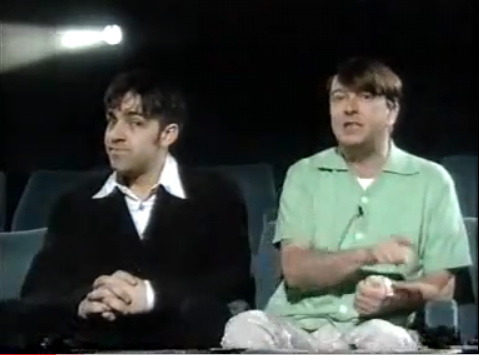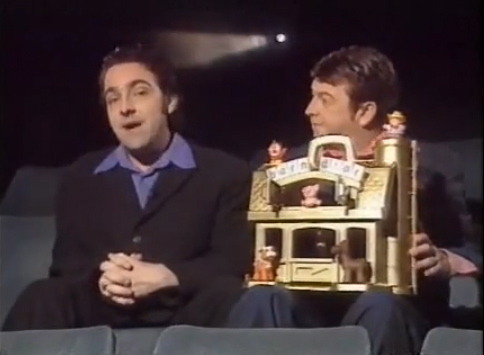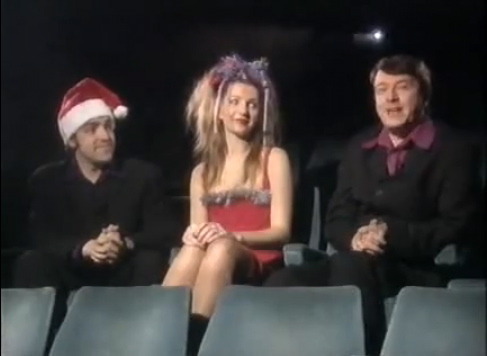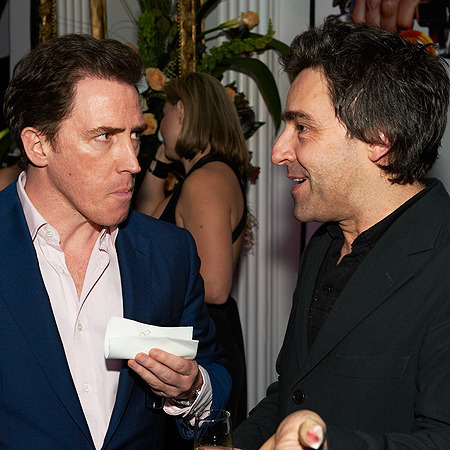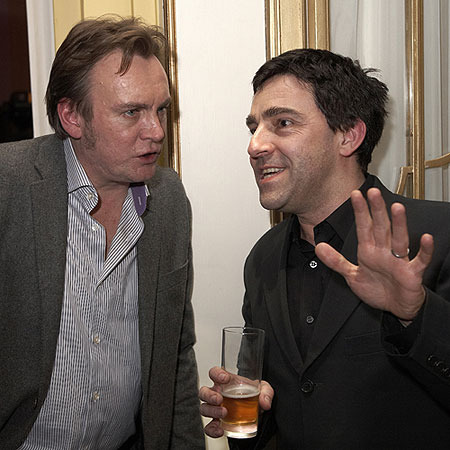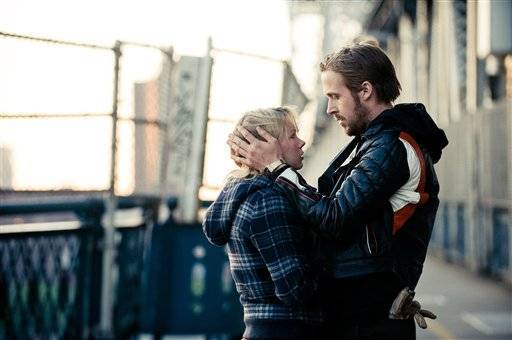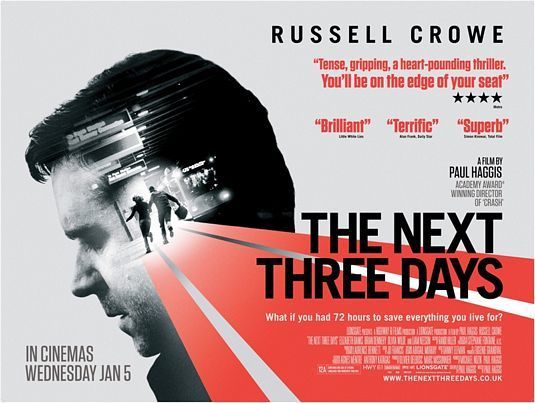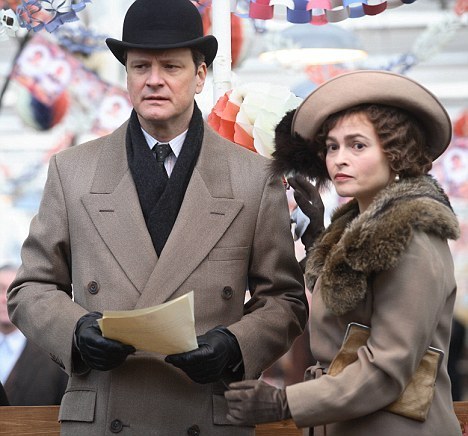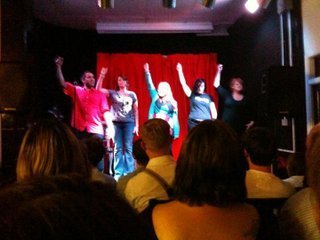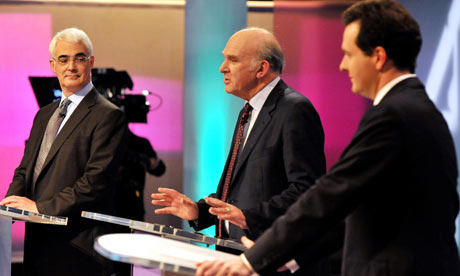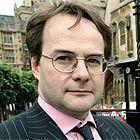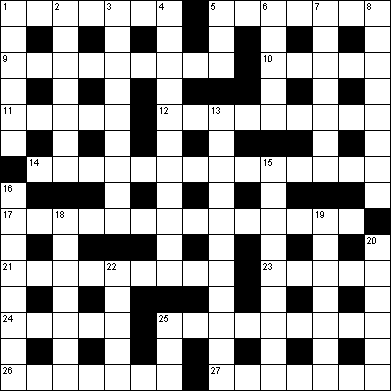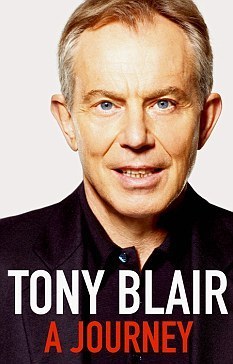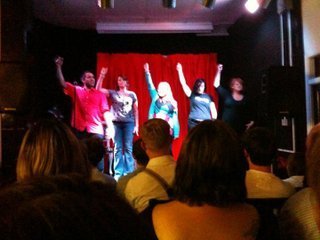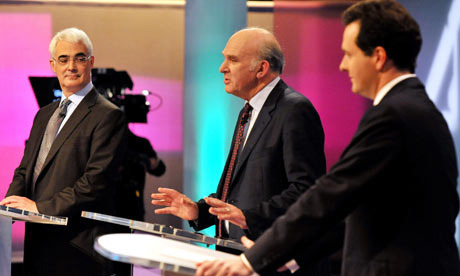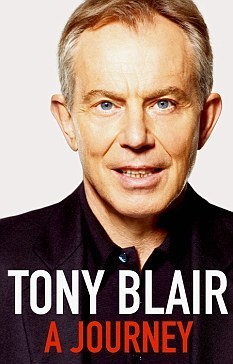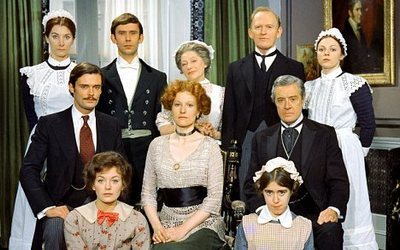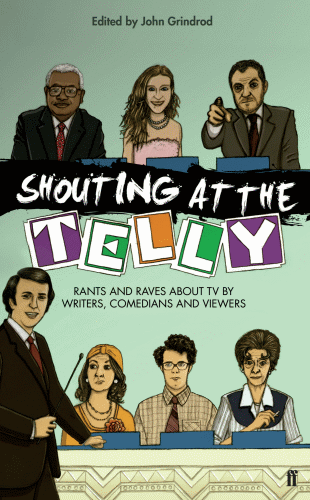Andrew Collins's Blog, page 61
January 30, 2011
18 months in an open-necked shirt
In two Saturdays' time, I will be reunited with Stuart Maconie on the radio (6 Music, 10am-1pm). My thoughts inevitably turn to the modest glory days of Collins & Maconie, the first double act I was part of, between 1992 and 1997, briefly reunited as two-thirds the trio Collins, Maconie & Quantick with David Quantick in 2001 and 2002, but effectively disbanded after that as Stuart and I moved in different broadcasting directions, and I allowed scriptwriting to eat up more of my time. Our 18-month foray into television, albeit late-nite television, was Collins & Maconie's Movie Club, a charmingly fleabitten movie review show with a siege mentality that went out on ITV before it was ITV1, every week, without a break, between 1996 and 1997. A chap called William Tennant drew my attention to three clips of the show on YouTube which I didn't know existed, and can be viewed below. (I have every one of the 18-month run on what I believe are called videocassettes, but they're in a box, and that box was, this very week, transferred from my house to my parents' attic for storage.)
For those too young to remember it, or perhaps had a job in 1996 and weren't going to stay up until 1.40am to see two men in suits and open-necked shirts talking in a cinema, the Movie Club was made by Watchmaker, Clive James' production company, and was seen as a natural, medium-hopping progression from Collins & Maconie's Hit Parade, our then-weekly Radio 1 singles review show. (It amazes me now that we were indulged enough to have our names above the title in both shows!) The same late-note slot across the whole week was put out to tender by ITV, and we somehow snared one of them. Neither of us could quite believe our luck. Thanks for the most part to the ingenuity and drive of producer/director Andy Rowe (now ubengruppenfuhrer of Saturday night light entertainment at the BBC), but not forgetting the resourcefulness and, frankly, patience, of the compact, on-site production team – which numbered six most weeks, including Andy – we shot two in a day each fortnight in the Riverside cinema, Hammersmith, with a fake projector set up using a single light and some dry ice as it was easier, and more effective, than involving the real projectionist.
The format was achingly simple: three new releases and some videos reviewed by the pair of us – we couldn't afford Autocue so we'd learn all our links like actors – sitting in a cinema. We added a couple of comedy items: the Hollywood Hotline, in which I would pretend I was talking to a star on a mobile phone, whom you couldn't hear, and Stuart would react to my inappropriate handling of the call; 101 Years Of The Cinema (I think it was called), where we played cineastes in black polo-necks smoking Gauloises – and we actually smoked in the cinema! – wrongly covering the history of the cinema by theme; Crikey! Movie News, which was fake news based upon funny old black and white film stills; and another one whose title escapes me where we'd reconstruct iconic movie scenes using toys. I know what you're thinking, and no, we didn't copy this off The Adam & Joe Show, even though that started in 1996, and the Movie Club didn't start until 1997. I think the four of us have agreed that it was a coincidental double-conception – there's no way we'd have been stupid enough to lift it, so either we hadn't seen it, or they hadn't started the toy parodies at the time we were preparing the format. In any case, Adam and Joe did it miles better and took it so much further, while we ditched ours after about six weeks as it was too time-consuming! (When I first met Adam, circa 1998, when our show had been taken off and theirs was flying, we declared ourselves fans of each others' work.)
That's pretty much it. We introduced a weekly visual joke for the end of each show, and we tried to be funny in all our links, and to involve the audience, in an early example of interactivity, by getting a viewer in to guest-review one of the films. Among the stars of tomorrow we had in were Ali Caterall, now a reviewer at the Guardian and Word, and none other than Sarah Millican, who I believe was in mid-career-change at the time. (In the days before email, viewers had to, like, write to us, and send us a cassette or videocassette of them reviewing a film, and send it through the post and everything.)
It was bags of fun. They would often be shooting TFI Friday in the big studio at the same time, so we'd usually bump into a band we'd interviewed in the canteen and they'd ask us what we were doing there, as very few people seemed to actually know the programme was on. (Having said that, I once watched it in a rented house in Dublin with Billy Bragg and Wilco, which was odd, and Joe Strummer claimed he was a fan and became quite irate when I met him and informed him that ITV had taken it off the air.) Our budget was small, but it stretched to four John Rocha shirts, which we rotated under our own jackets. (They had really long arms with massive cuffs for which we had no cufflinks, so we always used to announce their arrival "on set" with the phrase, "John Rocha pour le singe." Such in-jokes kept us going.) When it ended, after an astonishing, uninterfered-with 18-month run – during the latter part of which it also went out on Paramount Comedy – it was like an eight-piece band band splitting up. Watching the clips again, especially the willfully cheap opening credits, takes me back to a time when we felt on the cusp of professional careers in radio and TV, and although TV has only been sporadic for me in the years since (Stuart's been on a lot more), those 18 months stood me in good stead.
Stuart and I are looking forward to shamelessly nostalging about those golden years when we reunite on 6 Music. It's allowed, right? In the meantime, if it pleases you, here are the YouTube clips, which includes the review of the 1997, when we awarded the first and only Barn D'Or award for Film Of The Year to Shane Meadows' debut Small Time. This is something we remain proud of, and Shane never complains if we point it out. We made him. (Oh, and during the run, we were offered Woody Harrelson as a guest, but we turned him down, as we didn't have guests. How cool, or uncool, was that?)








January 21, 2011
Alright, m'duck?
Well, finally saw the film they're all talking about, and now I'll be talking about it too. Black Swan is the reason I was asked, on the day before New Year's Eve, to write that ill-fated profile of Natalie Portman for the Observer, which pretty much got me branded a Zionist by a single-issue nutter in the comments section. Phew. Glad that's all over. And so to the film that has already bagged Portman a best actress Golden Globe, and looks all set to bag her a Bafta and an Oscar (although Black Swan director Darren Aronofsky will be wary of calling it a sure thing after Mickey Rourke failed to complete the hat trick for The Wrestler two years ago).
In brief: Black Swan is nuts. Certainly it's a "ballet film" and a "psychological thriller", by twin definition, but neither really does it justice. To my mind, Aronofsky has made his Rosemary's Baby. This is high praise, although it comes at a price. I can't think of a film it reminds me of more; not The Red Shoes – although there is plenty of that theatricality in there, albeit muted (ha ha, swan joke) – or Fight Club – although, again, the split personality is key. It's grainy enough to look like a film made in the late 60s or early 70s, and that's to its credit; although the New York it depicts is as glassy and sleek as the architecture around the Lincoln Centre, where classical meets modern, and as throbbing and drug-pumped as the dance music played in the clubs - the tenements, brownstones, walkways, yellow cabs and subway cars could easily be taken from Death Wish or Taxi Driver or indeed, Polanski's first American-set film (Aronofsky apparently loves The Tenant, set in Paris – as do I – although I wasn't aware of this explicit connection when I formed my own with Rosemary's Baby).
I saw Black Swan with a theatre-full of Radio Times media buyers and clients at a special screening last night (I was required to provide an introduction): mostly young, not necessarily cineastes, who'd been getting into the spirit of ballet by doing some warm-up exercises at the bar – GEDDIT?! I got the feeling they didn't know what to expect, which is ideal. There was certainly a lot of nervous laughter in the lighter patches, and some fantastic vocal reactions to the film's nastier, more physical dares. It was a good environment in which to enjoy the film; it's not as chin-stroking as you might expect. What it mostly resembles is a kind of pre-slasher 1970s horror, with lots of shocks, and corridors, and darkness, and characters turning round to come face to face with other characters, and some superbly unsettling soundtrack stings by Clint Mansell (whose score turns out to be ineligible for the Oscars because it contains so much of Tchaikovsky's Swan Lake – a-boo!). Aronosfky has a great time. It's overwrought, melodramatic, gothic and at times ridiculous, but it's a film that's worth seeing. It's certainly not standard Oscar fare, at least not outside of its achingly award-hungry central performance.
Portman is sinewy and bony and gaunt, and when certain corporeal fates befall her body – either real or hallucinated – you'll believe she could snap in half. Her dancing seems utterly convincing, and that year of "pump camp" was well worth the effort. Mila Kunis, too, is damned convincing en pointe. If you follow my blog, you'll know I have a great fondness for seeing ballet, especially live, an appreciation I have developed in my forties, to my own surprise. For this reason, I was fascinated by all the detail about preparation of footwear and toes, and the punishing nature of the choreography and training. It's an intriguing world, where you can easily imagine a fragile young dancer slowly destroying herself, as Portman's Nina seems always about to do, right from the start.
Fantastic, if horrifying, panto performance from Barbara Hershey, who looks like she is wearing a Barbara Hershey mask, so pulled and unreal is her actual face. Winona Ryder also terrifying as the washed up, marinated no-longer-prima ballerina. Vincent Cassel lets the cast down; although one must assume Aronofsky wanted his artistic director to be a preening, lecherous, arrogant prick, some of his lines are so over the top he veers into farce.
Hey, much of the film is farcical, but it's driven by such a commitment to horror and psychobabble, it's impossible not to be sucked into it. It's not Aronofsky's best film, and although it's grander than The Wrestler, it's too much like it in texture and tone, too murky to really convey the high theatre of ballet, even in the Swan Lake scenes.
I'm afraid you're going to have to see it, though. Just be prepared to gasp and groan and bleurgh in the cinema. It's all part of the fun.








January 20, 2011
Radio Times Zelig, slight return
Had a lovely time at the annual Radio Times Covers Party on Tuesday night. (I think we have it on a Tuesday night so that we can turn the coverage round for the next week's magazine. It does always seem to be on a Tuesday, a frankly underloved night of the week.) It's an excuse, every year, for me to stand next to some of the actors, producers and performers that I admire off the telly. I may be something with Editor at the end of it at Radio Times, but this doesn't reduce the fan in me. So, with a magically self-refilling flute of champagne in my hand, I managed to bother Rob Brydon, Steve Pemberton, Keeley Hawes and the great Joan Marsh this year. David Morrissey, who I bothered last year along with James Nesbitt, said hello but left before the great post-presentation luvvy-a-thon. Thanks to RT's Stuart who took the above pic on his phone, even though we were in the area outside the Claridge's Ballroom where professional portraits were being taken for the magazine. Doctor Who fans will be jealous that I was in the same building as Amy Pond in some hot pants, but this was frankly wasted on me. I'm far more excited about having thanked Jean Marsh for Upstairs Downstairs. There is a whole reel of star-studded pics here. I'll publish a few more next Tuesday, once the magazine is out. Don't want to steal their thunder. In the pic below you can see how good an actor Brydon is, as he convinces me that he's interested in what I'm saying.
And look, two years ago, in virtually the same spot, I bothered Philip Glenister. Ironically I was talking to him about the sitcom I was writing, which eventually got rejected by the BBC, but has now been accepted by Radio 4. I wonder if he remembers the conversation, and the name of the sitcom? Note: same jacket. But different black shirt, so let me off.
I wonder if I will ever become blasé about meeting these people. I really hope not.








January 15, 2011
Just married
Each year the Oscar frontrunners emerge before Christmas, as the Golden Globes and Bafta nominations start to solidify around a seemingly preordained handful of films. This year, The King's Speech, 127 Hours, Black Swan, True Grit, The Fighter, Inception, Winter's Bone, The Kids Are All Right and Blue Valentine seem to have it sewn up between them. There's no such thing as a sure thing, but patterns have already formed. Last night I was waiting in the Curzon bar to see Blue Valentine, this year's indie outsider along with Winter's Bone, for awards season glory, and the place was rammed with mostly older couples there to see The King's Speech, whose later showing was already advertised on notices as being sold out. It's a small cinema, but nevertheless "sold out" is an unusual notice to read there. You have to hand it to The King's Speech – it's the film that's really getting people out to the cinema.
There were only 14 of us in the Curzon's smallest screen to see Blue Valentine, but then, hey, it's a low-key, downbeat, grainy little indie whose "stars" are not Colin Firth and Helena Bonham Carter, and is not designed for a mass audience. It's a much more interesting film than The King's Speech, in that it operates at close range and presents an unflinching portrait of a young, three-year-old marriage on the verge of collapse. It has one joke in it, which is told by Michelle Williams' character Cindy to Ryan Gosling's suitor Dean on a New York bus, and it gave all 14 of us a welcome little release of laughter amid the gloom. (I won't re-tell it here, but it involves a small child and a child molester, and might be described as off-colour. It's superbly chosen, and I don't know if it was scripted by first-time director Derek Cianfrance, or improvised by the actors, but its focus on violence towards a child is jarring, since the couple's devotion to their child is the one thing that unites them as they fall to bits. The more I think about the joke which made us all laugh, nervously, and with relief, the cleverer I think it is.)
It's not startlingly original to depict a relationship's beginning and its end, nor to show the end first, as Blue Valentine does, or at least jumps back and forth between the sour outcome and the sweet beginnings. But it is disconcerting to witness the first time Dean and Cindy meet, by chance, at an old folks' home – he's there as a removals man, she's there settling in her grandmother – and his cute first attempts at wooing her, intercut with scenes from a dying marriage, poisoned, or so it seems, by routine, drink, the stresses and strains of bringing up a daughter, and Dean's hair falling out. (The physical changes, more blatant in Gosling – who may well have had the front of his head shaved – are both a neat temporal identification device, and shorthand for physical neglect. Cindy changes too, but her spirit seems to shine through, perhaps because, as a nurse, she has someone else to think about while working; Dean paints walls and spends time mainly with himself.)
With a soundtrack by Grizzly Bear to match the ubiquitous plaid shirts, and plenty – too much? – grubby, realistic sex, this is at times a sort of parody of an indie love story. Unlike Winter's Bone, its Oscar tokenism nemesis, its setting is familiar, its message well-rehearsed, and the strain for shrugging, mumbled realism robs Blue Valentine of all melodrama. This may be a good thing, but Winter's Bone takes us somewhere we don't normally go, and manages to spice the everyday story of Ozarks folk with thriller elements and a certain Gothic unreality.
I'm not complaining. You will certainly buy Gosling and Williams as a couple, at both ends of their relationship, and details about each character's own upbringing are sketched in, not banged home with a mallet, which is a change.
Just as indie was never meant to describe a musical style, nor should it be used to describe a cinematic one. But it is one, isn't it?








January 9, 2011
72 Hours
Never mind 127 hours, this film does it in 72. Actually, it doesn't. Most of the action in The Next Three Days – whose underwhelmingly generic title seems almost designed to induce indifference and prevent you from going in to see it – actually takes place before the three days in question, but hey. (It's funny to hear people asking at the box office for "a ticket for the next three days, please.") It's the fast-turnaround Hollywood remake of a well-liked French directorial debut from 2008, Anything For Her or Pour elle, which is a better title either way. I didn't see it, but I know it was about an ordinary, mild-mannered geography teacher who has to break his wife out of prison after she is wrongly convicted of murder. The American remake, written and directed by Paul Haggis, seems to be pretty much identical. Except Russell Crowe is an ordinary, mild-mannered English teacher, which gives him the opportunity to be shown teaching a class about Don Quixote and Haggis the opportunity to make some comparison between what he has to do and what Cervantes' hero had to do, although to be honest, I've forgotten what profound thing this was.
It's a pretty good thriller, actually, the sort that would work just as well when it turns up on telly, and which strives for Hitchcockian, as they all do, and never quite gets there. I haven't seen the original, so I'll take it on trust that it's virtually identical, because I've read that it is; except it's about 30 minutes longer. Why? What has Haggis added, or stretched out? I don't know. But it seems a little self-indulgent, or flabby, to fail to wrap up the same film in roughly the same running time. Maybe the big stars like to be on screen for longer? Maybe a 122-minute film feels more important than a 96-minute one?
I have no problem with Russell Crowe. I didn't like him in Robin Hood, but I'm generally happy to see his craggy, weatherbeaten features on the front of a leading man in general. He's a big, Gary Cooper/John Wayne/Spencer Tracy beast, except with enough James Stewart everyman to carry off roles that exist beneath or outside the bluster of action man heroics, such as The Insider, or A Beautiful Mind. Here, he's a James Stewart who has to find his inner Gary Cooper, and he manages both, notwithstanding his beefed-up bulk, which doesn't exactly scream English teacher. At least he keeps his jacket on throughout. He can be a very quiet actor, which I like. Tom Cruise, who I like for different reasons, would struggle to convince as an English teacher. (And that's a compliment to English teachers.) Anyway, I went to see The Next Three Days with virtually no foreknowledge of the plot, or even who was in it. So it was, for me, a pleasant surprise to find Elizabeth Banks as Crowe's banged-up wife, Liam Neeson in a single-scene cameo as an old lag, our own Lennie James as the detective (he's an honorary American now, as so many British actors are), and Brian Dennehy, House's Olivia Wilde and Daniel Stern in tiny parts, too. All this decent casting gives a thriller an edge, for me. No matter how unlikely the plot is. (Hey, I enjoyed the first two seasons of Prison Break – I don't need it to be a documentary.)
All credit to Fred Cavayé, who wrote the French original: the essentially preposterous prison breakout plot unfolds with enough inconvenient setbacks to counter its convenient jackpots, and you won't see Crowe's Neeson-predicted Eureka moment coming (unless you saw the original, in which case, you will see it coming). No more plot details. Don't want to spoil your fun. Paul Haggis is a capable action director, although is that really what he's for? There's a lot of air blowing through this one compared to the issue-heavy films he's directed previously (Crash: racism comes in many forms; In The Valley Of Elah: war, what is it good for? + you can't trust the US military to solve its own crimes). I guess we shouldn't complain about that. It's a functioning thriller, not a polemic. Also, some dislike Haggis's finger-wagging. There is none of that here, just Russell Crowe running, driving, writing things on a map, trying not to get beaten to a pulp by Pittsburgh's shady underworld characters while he attempts to buy false passports and successfully keeping his young son onside until those "next three days" kick in.
Unlike 127 Hours, I do not urge you to go and see it. I like to save up my urging. Although I enjoyed it.








January 6, 2011
Utah faint

Here it is, then: along with The King's Speech, the other overhyped "first great film of 2011″ …
127 Hours. Like The King's Speech, it's British-made, Oscar-ready and based on a true story. Unlike The King's Speech, it mostly won't give you a warm feeling inside. On the contrary, you may spend much of its 94-minute running time squirming, groaning, shaking your head, feeling existentially miserable and, towards its climax, arching your whole body in your seat like I did, pushing your feet against the seat in front and stretching your neck behind the headrest. Yes, it's a film you will know you've seen after you've seen it. Unlike The King's Speech.
Danny Boyle, who directed it, and Simon Beaufoy, who co-wrote it with him, have not wasted a single drop of the goodwill afforded them after the success of Slumdog Millionaire. Having worked for years with Alex Garland, Danny seems to have found a new best friend. Their screenplay, based on Aron Ralston's bestselling account of what happened to him when he got his arm wedged behind a boulder in a canyon in Utah in 2003, is less about dialogue (although there is some), and more about the skilful ordering of events, and the judicious use of flashbacks and hallucinations, ultimately conveying the treacly passage of time and the churning over and over and over of the implications until a this-is-it decision is made.
Not sure if we need a SPOILER ALERT here, as Ralston's remarkable story came out in book form in 2004, and, thanks to the publicity around the film – and boy has there been a lot of publicity – it's back in circulation again. The film is called 127 Hours and even the most cursory precis will tell you that he's a sort of extreme thrillseeker who gets trapped in a canyon for 127 hours before escaping to write a book. Most articles and reviews I've read also tell you how he got out of there. For me, knowing what he did, in real life, is what powers the film. I had read about the real event in detail, and I went along to the film in the secure knowledge that Danny Boyle was going to show me that event, and that it would be at the end of the film. It's like going to see Titanic. Hey, or The King's Speech. It's not the destination, it's the getting there that counts.
In many ways, 127 Hours is pure cinema. It's as if someone set Danny Boyle an exercise: take this very specific true-life adventure, with one protagonist, stuck in one place, where time passing is a key element and most people know that he survives and has to do something pretty unusual to ensure that survival … and off you go! The blend of narrative economy and visual fireworks is brilliantly stirred: it's still and quiet and logical and practical and functional when it needs to be, and it's dazzling and jolting and imaginative and impressionistic and rollercoasting when it needs to be – and it needs to be both. Have you seen Gus Van Sant's Gerry, with Matt Damon and Casey Affleck? It's a useful point of reference: another film, a lot more loosely based on actual events but rooted in reality, in which two young hikers get into trouble in the great outdoors, this time wandering off the beaten track in Death Valley and getting lost. I guess the big difference is that in Gerry, the action is partly improvised, and it shows, in a good way and a bad way. Here, everything is tightly choreographed, and it pins you to your seat because of that.
James Franco is amazing as Ralston. He's onscreen the whole time, mostly stuck in his predicament, sometimes filming himself on a camcorder and even playing up for the camera, allowing us to read his mind when Boyle isn't actually showing us what's going on inside it. I had my doubts about Franco, especially after the Spider-Man films, but he's turned it around, mostly thanks to Judd Apatow, who cast him on TV in Freaks & Geeks before he became Harry Osbourn, and set him back on the right road with stoner parts in Knocked Up and Pineapple Express, after which our old pal Gus Van Sant cast him as Harvey's boyfriend in Milk, and all was well with his world. 127 Hours will surely earn Franco his first Oscar nomination. There's a lot of acting going on up on that screen.
Boyle is often characterised as a risk-taker, and there's a lot of truth in it. Slumdog was a risk that paid off. So was 28 Days Later before that. And Sunshine, which didn't pay off quite as handsomely, although I really loved it up until the ludicrous denouement. Trainspotting itself wasn't the sure thing it seemed once the marketing had kicked in, and nobody knew what Shallow Grave would do, or whether there was even an appetite for a Scottish chamber piece. And as much as I disliked it, you have to hand it to him for having a crack at a large-canvas American screwball comedy with A Life Less Ordinary. He's a useful person to have on our team, and although the hype around 127 Hours can seem offputting, and you more you read about it, you more you think you know what it's going to be like, it really has to be seen.
A word about the defining act of the story and the advance squeamishness you are feeling about it (just as I was until this afternoon at the Curzon): it's beyond belief what Ralston did to free himself, and it is the film's money shot, or shots. But that's not to say it's exploitative. If you enjoy the Saw movies – and, after the first one, I categorically do not – you may still be shocked. Not shocked by what you see – as with all the best cinematic gore, it's as much imagined, and felt, and heard, as seen – but shocked to see a sequence of extreme corporeal violence that is actually central to the story. The bloody shocks in Saw are designed to shock and shock only. This one is designed to make you ponder your existence. No, really. Ralston was – and presumably still is, in his DNA – a loner. A true independent spirit. He jumped down canyons alone, with his headphones on, at one with nature and the last great wilderness, but at one. Most of us would prefer not to be on our own for 24 hours, let alone 127, and if trapped as he was, we might not have had the mental tools to get out of it.
I am not an adventurer like he is. Never will be. But nor, I hope, am I selfish, arrogant bastard who ignores his mother's ansaphone messages and takes off without telling a single soul where he's going. But there's even a postscript to all that at the end.
Warning: 127 Hours contains a song by Dido.








January 5, 2011
Comment is free
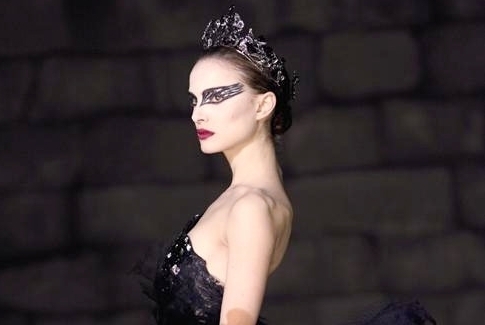 OK, here's where I break my first New Year's Resolution, but it is an illuminating case. I don't get to write for the newspapers very often. But in the limbo between Christmas and New Year, the Observer called and asked me if I would write a 1,450-word profile of the actress Natalie Portman. It was New Year's Eve. I said yes, and spent the rest of the day researching it, online, and writing it up. By the time I filed the copy, at around 6pm on Friday December 31 for publication on Sunday January 2, I was something of an expert on Ms Portman's life and work. It was to tie in with the imminent release of the ballet thriller Black Swan, which is kicking up quite a lot of interest because Darren Aronofsky directed it, it has received seven Golden Globe nominations and it has a lesbian scene in.
OK, here's where I break my first New Year's Resolution, but it is an illuminating case. I don't get to write for the newspapers very often. But in the limbo between Christmas and New Year, the Observer called and asked me if I would write a 1,450-word profile of the actress Natalie Portman. It was New Year's Eve. I said yes, and spent the rest of the day researching it, online, and writing it up. By the time I filed the copy, at around 6pm on Friday December 31 for publication on Sunday January 2, I was something of an expert on Ms Portman's life and work. It was to tie in with the imminent release of the ballet thriller Black Swan, which is kicking up quite a lot of interest because Darren Aronofsky directed it, it has received seven Golden Globe nominations and it has a lesbian scene in.
Anyway, I was delighted to be asked to write something for a national newspaper. They don't use non-contracted freelancers at the Guardian and Observer as a rule, so they must have been pretty short-handed to offer me the gig. It appeared online on the Saturday night, and in the paper the next morning. They cut some passages, and neatened it up, but it's pretty much as I wrote it. A couple of attempted gags, but mostly fairly vanilla. It is, after all, a profile, and not an opinion piece. It's not about me, it's about her. You can, if you wish, read it here. It's pretty benign stuff. Or so I thought.
By the end of Sunday, in the statutory comments section underneath my piece, I had, variously, been accused of "intellectual snobbery", of being "embarrassingly in love" with my subject, of using "a stupid turn of phrase", and of tacitly supporting Israel's massacre of Palestinians because I failed to mention Portman's association with Alan Dershowitz, the pro-Israeli lawyer who publicly defended Israel's attacks on Lebanon in 2006, and her own failure to denounce the state of Israel, where she was born. After – stupidly – leaving a comment defending my decision not to write in detail about the Israel-Palestine question because that wasn't the piece I was commissioned to write, I was duly accused of "recoiling behind the convenient and elastic idea of not being asked to engage into a political agenda."
Hey, most of the comments – an astonishing 73 before they closed it – were harmless, either commending Portman for being a committed vegetarian or doing a degree at Harvard and potentially harming her own career in Hollywood; others discussed the merits of Black Swan. But even when writing a vanilla profile of a Hollywood actress, you still draw aggressive flak from certain quarters. (In other papers, profiles of this type are run without a writer's credit.) To be honest, I can take or leave Natalie Portman. She's alright. The new film looks interesting. I couldn't give a toss whether or not she was in the rubbish Star Wars films. She comes across as a bit of a dullard in interview, and I'm certainly not that impressed that she did a degree. I know lots of people who've done degrees. They are not better than the people who didn't. But I reiterate: it's not about me, it's about her. The big illustration is of her. That's what a profile is. Had I interviewed her, and failed to ask her why she killed all those Palestinians, I would be journalistically deficient.
I have pretty firm views on Israel and Palestine. So, I'm sure, does Natalie Portman, having been born in Jerusalem, but these are not in the public domain, or at least, over the course of an afternoon at my laptop, I didn't come across any. I know that she studied under Dershowitz, but didn't think it central to a profile of her life and work. Maybe a profile of Dershowitz? You'd be amazed how quickly 1,450 words get eaten up. (One commenter castigated me for not mentioning Goya's Ghosts, a film she was in. She's been making films since the mid-90s; I did not mention them all.)
All this goes to show why you should not get sucked into a dialogue with anonymous posters on newspaper comments sections. I've done it before, and I had sworn not to do it 2011. It only took me two days to break that resolution! And there really is no reasoning with someone whose views on a volatile international political situation are so passionate they feel the need to weigh in after the profile of an actor.
Oh, and later on, I got this: "This obsequious gushing about how perfect Ms. Portman is in every way is simultaneously dull and distasteful; it's rather like reading a lonely man's intellectual masturbatory fantasy."
Spare me. (Mind you, in my haste, I did say she was "christened", which is rather unlikely for a Jew born in Israel. But the Observer subs didn't pick it up either. It was New Year's Eve!)








January 2, 2011
Please be upstanding
First big film release of 2011, and, unusually, I've actually seen it in advance, thanks to a special Curzon screening before Christmas: The King's Speech. You can't move for advance hype, which seems to be working, judging by the seven Golden Globe nominations and countless US and Canadian critics' circle awards from Detroit to Dallas Forth Worth. We are looking less at a film here, and more at a global marketing strategy. It's a British film that has been cunningly released in North America first so that it generates the buzz of a "limited release", picks up festival props, and qualifies for the 2011 awards season. It was farmed out for special preview screenings like the one I attended before Christmas so that it would also qualify for the Baftas and the British Independent Film Awards – which showered it in glory in December. So, it is finally released here nationwide on Friday, following weeks of being trailed at cinemas and amid acres of coverage in the newspapers (and a paid-for advertorial "pull-out" in today's Observer). When people duly troop out to see it on Friday, many will feel as if they've already seen it.
The King's Speech seems to have been handled as if it were an indie sleeper hit in the making, when in fact it is a big, populist period romp, the type we're awfully good at and can't resist presenting to the rest of the world. (The Yanks have certainly fallen for its charms. Are they that easy to win over? Perhaps, just like I did with Happy Days in the 70s, they think it's a contemporary drama.) This is the film that's got it all: a newsreel-familiar backdrop taken from schoolbook 20th century history – namely, the 1936 Abdication Crisis, with its well-worn narrative markers: Wallis Simpson, the resignation of Stanley Baldwin, the storm clouds and outbreak of war – a potentially farcical and yet helpline-ready conceit at its core – the curing of a speech impediment – and three tailor-made parts, two of them iconic, for fine actors to get their teeth into: reluctant, stammering King George VI (Colin Firth), the game, convention-defying Queen Mum-to-be (Helena Bonham-Carter), and Lionel Logue, the eccentric, freewheeling Australian speech therapist (Geoffrey Rush).
If you've seen the trailer – and if you've been to the cinema since November, you will have, again and again – then you'll know the story: the Prince, as he is to begin with, is unsuited to public speaking due to a stutter and must overcome his affliction in time to make a key speech that will unite the country now at war. Will he do it? Yes he will. It is written. Just as the decisive free kick in Bend It Like Beckham was written.
So it is that we have a film that's impeccable in every sense – the acting, the writing, the period recreation, the music, the marketing – and yet one with no jeopardy built into it at any stage. It's like Clint Eastwood's Invictus in that sense: we know the final score, we know that nobody dies except King George V, but we're prepared to climb aboard for the ride just to see the lovely view. However, I actively disliked Invictus, while it's actually impossible to dislike The King's Speech. Tourists are fascinated by our royal family; they're a period piece wherever they go and whatever era they're in, so any drama that features them, ancient or modern, suits the backward, forelock-tugging, slightly frilly, sexually repressed image of the United Kingdom foreigners prefer. So you can see why the Americans are eating this up, and letting us off for the fallback portrayal of Mrs Simpson as a controlling, vulgar, social and constitutional virus (a nice turn by Eve Best, who's actually English – she's in Nurse Jackie).
It's a gift that, in truth, the man who unlocked George's stammer was a gregarious, unconventional Aussie who refused to bow and scrape; this, again, chimes with the orthodoxy that Englishmen are uptight, and foreigners free. Firth is note perfect as the comedy King; Rush actually very subtle as his nemesis-turned-saviour. Whether it's accurate or not, when Logue coaches George to use swear words to unclog his stutter he provides another British actor in a British film with another British excuse to let go and turn the British air blue. Since Hugh Grant did it at the start of Four Weddings, it's been compulsory. Ha ha, listen to the stuffy British man say "fuck"!
I am filled with admiration for The King's Speech and I won't mind a bit if it wins some more awards and earns its marketing team a week off. It's expertly staged. It might win Firth the Oscar we can all say he should have won for A Single Man. I just wish that once in its 111-minute running time, I'd been surprised. Just as I felt I'd already seen it when I hadn't, now that I have, I can't quite remember whether I have.








December 31, 2010
2010: wounded knee
This is not a review of the year. It's a review of my year. And a partial one, as I've run out of time and if I don't post it now, it's going to look pretty daft. So how was it for you? Here's how it was for me. It's almost done now, and what do I have to show for it? Well, a scar on my left knee. Early on in 2010, I tripped and fell at the top of the escalator that travels up from the Jubilee Line to the National Rail link at Waterloo, in London. I was wearing some new trainers whose laces were too long, and one of them got caught in the moving stairs as I was about to step off. This is the first time this has even happened to me, in a lifetime of travelling on escalators, and 26 years of using the public transport system in London on an almost daily basis. I tripped and fell flat on the floor. I picked myself up immediately to assure fellow travellers that I was not injured, dusted myself down, picked up my bag and kept walking. Although I'd fallen on my knees, my trousers were not ripped. This was a result. (A few years ago, I fell down some stairs at an overground station in South London and tore holes in both knees of a pair of trousers I really liked, something that made me self-conscious all day at 6 Music – I felt like Just William.)
However, closer inspection when I got home revealed a lot of blood and pretty big tear in my left knee – not the trouser, the knee. It healed quickly enough, but I didn't get the Arnika on it quickly or regularly enough in those crucial first days and I've been left with a meaningful scar which I might not have been. This scar, just a short curve of angry red on my knee, might just sum up my 2010.
Firstly, to quote the title of William Leith's 2008 book, bits of me are falling apart. Although the knee scar is a self-inflicted injury, I have reached an age where physical decline begins in earnest – the noises when you sit down and get up, the heartburn, the spiraling inability to drink heavily and do anything the next day – and all attempts at healthy living and preventative medication are launched on a sloping playing field. I have started running to stand still, in health terms, and by that I don't mean I have started running. Better get used to it, I suppose. That and the fact that – apparently – people you know start dying when you're in your forties. This is not as advertised. I kind of assumed that didn't start until your sixties!
I haven't started running, but I do plenty of walking – anyone who uses public transport does – and in fact, all that walking and observing and thinking and transport-using helped me create my first one-man comedy show for Edinburgh, Secret Dancing, a major achievement and milestone for me which, on its own terms, was a success. I thoroughly enjoyed writing the show, building it up around various unconnected ideas – unconnected ideas which in their very unconnectedness sum me up, for better or worse – and honing it in front of paying and unpaying audiences in London, Brighton, Northampton, Edinburgh and Cardiff. Along the way, I admit, I harboured desires to become a stand-up comedian, and in this regard, I experienced some amazingly open-minded and unprejudiced support from those who actually have become stand-up comedians, and are stand-up comedians, as opposed to writers who cannot resist a dabble. As well as the obvious, Richard Herring, I was encouraged by Michael Legge, Phill Jupitus, Sarah Millican, Gary Delaney, Mat Ricardo, Jason Manford, Peter Buckley Hill, Martin White, stand-up musician Jim Bob and Robin Ince. This counted for a great deal.
I came away from Edinburgh feeling satisfied. Satisfied that I had been able to perform the same one-hour, one-man set daily for 16 consecutive days to full houses – to remember what order it all went in and to project it, clearly, once without a PA, due to a technical mishap. I also realised, through homesickness and all-round tiredness, that this was not an alternative career for me. To actually make a go of it takes more time and energy than I have at my disposal. To continue dabbling would, I felt, be an insult to those who really have paid their dues and continue to put in the hours of practice, development and self-improvement the job demands. I was offered a number of gigs in London when I got back from Scotland, and I politely declined them all, before even realising that I must retire. I can still see myself playing the fool onstage with Richard next year, and I retain the confidence to walk onstage in front of people and talk should I be required to do so, but it's not something I wish to pursue any further.
It's not often you get the luxury of making a big decision like that. So I will always look back on 2010 with fondness for that reason. I had a go. The last two years have been tough, workwise, constantly spinning the requisite plates (and two platters called Work and Life), and devoting all that time to meetings, pitching and proposing and "bouncing a few ideas around" on spec, and for no money whatsoever, in the hope of at some stage eliciting some development money or an actual, paid commission.
At the beginning of this year, I note, I was putting the finishing touches to the second draft of an ambitious comedy-drama I had in modest development with BWark, who make The Inbetweeners (and who thus had a very good year). That went to BBC Comedy and was rejected on the grounds that they had no hour-long slots. We duly took it to BBC Drama, who showed interest – showering me with praise, in fact – and then rejected it as they didn't have the slot for it either. It now sits in limbo. That's been a disappointing outcome. So was the fate of the sitcom I developed with another writer, which was again forged in the white heat of enthusiasm at an independent production company and was decisively turned down by BBC Comedy, this time because of the subject matter, which was out of fashion that week, after which the production company dropped it like a hot brick. (I was never paid a penny for all of the work that went into developing the proposal. Plumbers get a call-out charge. Writers do not.)
I am not moaning. It's the game. If you can't stand the rejection, you're in the wrong job. I am lucky enough to be connected to an ongoing BBC sitcom, Not Going Out, whose fourth series begins on BBC1 in the first week of 2011. This, as you probably know, was cancelled, then reinstated, against all BBC orthodoxy. It returns in a later slot, on a less important day than Friday, and there are only six episodes, instead of the usual eight, but I was very grateful to be commissioned to write one of them, with Lee Mack – gagged up by a whole team of other writers, of course – and it's called Debbie, or was.
Writing for a popular mainstream sitcom does open doors for a writer. I can "get a meeting", as they say in LA, but meetings do not pay money. However, this was ultimately a good year: I finally got a commission for a sitcom I've been trying to get commissioned – literally – for over ten years. At the beginning of 2009, amid great hope, I had it in development with BBC Comedy, but, after nursing me through six drafts of a pilot script, they passed on it. Due to the tenacity of the production company, Avalon, it has now found a home at Radio 4 – Mr Blue Sky will be my first ever solo-written comedy, four episodes ordered up, and we start rehearsals in February. This has been the best news of 2010, professionally. (The worst was probably BBC2′s loaded decision to move The Persuasionists, the advertising-set sitcom on which I was script editor, to some godforsaken graveyard slot mid-run, to protect it from being seen by anyone. I was angered by the personal abuse Iain Lee, one of the stars, endured on Twitter, and impressed by Adam Buxton's response to the show's failure. All I can say, with my hand on my heart, is that when we were making it, and filming it, we all thought it was very funny. It just goes to show.)
My other source of professional joy has come from 6 Music, who, after a long period of estrangement, put me back on the subs' bench last Christmas, and have been giving me work ever since. This was the year that the axe hovered over 6 Music, and a phenomenal groundswell of support saw that axe withdrawn. I can take no credit for any of this – it was the listener campaigns that saved 6 Music – but it has been a fabulous time to be connected to the network again. (The fact that, coincidentally, I was in the studio when Lauren Laverne read out the reprieve press release – I was there filling in for Grace Dent's regular TV review slot, ever the deputy – was the most glittering prize.) Sometimes permanence can come from transience, as Richard and I discovered: asked to fill in for the missing Adam & Joe in February, we are still in "their" slot, almost a year later. We may not be contracted beyond the show we are actually presenting, but we feel like part of the furniture, and that, in its own way, helps pay back for all the free podcasts we've given away since February 2008.
I have, as I have made clear, mixed feelings about the way the podcast, or at least the semi-fictionalised relationship that drives it, has been evolving. Most of it is a joy, but regular listeners will have detected discomfort in some of my reactions to some of the extremes the Podcast Richard Herrin visits upon the Podcast Andrew Collings. This is kind of par for the course, I know, but controlled comedic abuse is one thing; when that spills over into the way I am regarded by our audience, it's something else. Richard gets away with a lot, because our relationship is based on proximity and a three-dimensional dynamic; my skin is not yet tough enough to handle the occasional shot across the trenches, usually fired in anonymity. Richard is far better at processing comment than I – this is something I have learned this year. When Richard refers on the podcast to my "made-up charity", it is funny because he knows that it gets under my skin and is a very bad thing to say about a registered charity, and he also knows it isn't made up … but when someone on Twitter says it, my hackles are raised. I need to get over this! Can I really be that I am becoming more sensitive in my old age, and not less? Who predicted that?
I was wearing trainers with too-long laces on the escalator because they used to be my gym trainers and when I cancelled my gym membership as part of an economy drive I decided to put them into daily service and was wearing them on the Tube for the first time. Nothing is unconnected. We are in a recession and I'm sure I'm not alone in watching the pennies this year. None of us knows if our job is safe. I may be self-employed, but cuts are being felt everywhere, including TV budgets, and these cuts affect us all, unless we are investment bankers. It's been a long time since I lived under a government I voted in, but the coalition have proved anything but the coalition advertised. They are a Tory government in all but name. Labour may have ushered in this financial mess – by, ironically, behaving like a Tory government – but Cameron and Osbourne seem to see it as a Shock Doctrine-style opportunity for social engineering and a Thatcherite Trojan Horse. Nick Clegg is powerless, it turns out. He will never again be voted for by Liberal Democrats. This is a bad outcome for him, and when he became a flammable effigy for protesting students, he must have wondered what the hell he'd done.
I have long held the view that the young generation are apathetic and apolitical. I was delighted to be proved wrong in 2010. I was a student in the 80s when we had means-tested grants and benefits and rent rebates. It was easier to be left-wing and angry with that feather bed beneath us. Today's students already have it tougher than we did, but the tuition fees rise seems to have broken the camel's back, or dragged the camel away from Loose Women and out onto the streets and into the refectory. Good. New Labour kicked the idealism and out of this nation, especially over Iraq (I certainly found mine ebbing away after the anti-war marches in 2003), and it's taken a while to get that back. I welcome it. There will be more to come.
I hope you either had a tremendous 2010, or you have made a commitment to have a better 2011., or both. There really is no point in sitting around moping and counting the lines around your eyes. I've been working too hard, I guess, but only out of self-preservation, and with my magpie eyes on a greater prize, hopefully not too far down the road. I know this: if you live like a shark, when you stop moving, you start to feel vulnerable. As detailed elsewhere on this blog, it's been a vintage year for intellectually stimulating foreign movies – and some English speaking ones – and my laptop has held out for another 12 months, and Tony Blair had to cancel some of his self-aggrandising mini-Nurembergs when his book came out. Some of my tooth fell out, but hey, that put a stop to the Double Deckers I had drifted, imperceptibly, into eating on a regular basis, as if reverting to childhood. Always a good time to cut back on the white flour and the sugar and the alcohol, a New Year. Because I've been writing back-up gags most weeks for the inspiringly quick-witted and fleet-minded Chris Addision on Five Live's Seven Day Sunday - and occasionally appearing on it as a guest, when someone has dropped out at the last mnute (I'm not proud; my career would fold if I started worrying about being second or third choice!) – a weekly commitment which continues in the New Year, I have probably read more newspapers in 2010 than in any previous years. I sort of hate them all, even the Guardian some days, but I don't want them to close down. An exclusively wired world would be a cold and lonely one indeed. I demand tactility!
I wish Word hadn't stopped my column. I wish I'd liked The Walking Dead a bit more. I wish I didn't hate and love Twitter at the same time. I wish I'd looked after me teeth. I wish I didn't care what anybody thought of me. I wish cream didn't make me sneeze. I wish I liked modern music a bit more. I wish I was as energised by socialism as I used to be, and did more for the environment, and liked the way I looked more, but come on, there are people living without fresh water in Belfast. Spare a thought for them.
Tomorrow is another year.








December 30, 2010
Upstairs Downton
Last year, I was asked to contribute an essay on television to the Faber book Shouting At The Telly. It's a very good collection of writing actually, with pieces by Boyd Hilton, Rebecca Front, Emma Kennedy and Richard Herring (and some people I have never met). I wrote about Upstairs Downstairs – the original – and I thought I'd republish it here, as the show is back, and it suddenly seems half-relevant. Thanks to editor John Grindrod for allowing me to reprint it. If you're interested in the book, you can buy it here. Or some other places.
WHEN LORD BELLAMY LOOKS AT THE CAMERA
By Andrew Collins
It is October, 1971, a Sunday night. With its familiar fanfare, the LWT ribbon unfurls from left to right across a black screen. A simple title card reads Upstairs Downstairs, under the imperious Alexander Faris theme tune (dah-dah-da-dah-da-daah); further captions inform us that the episode we are about to watch is called On Trial, written by Fay Weldon and set in November, 1903 (this information is accompanied by suitable etchings from Punch). The establishing location shot: we pan across white-painted Victorian townhouses through a foreground horse and cart, as an upright gentleman in a top hat passes a furtive lady in long skirt and bonnet. She tentatively ascends the steps of 165 Eaton Place, a prospective parlourmaid. A butler impatiently redirects her to the servants' entrance, "downstairs", thus deftly establishing in a wordless exchange the title's two-tier, olden-days caste system. A nanny with a pram passes across our field of vision, because it's television law. A portent of things to come, the downstairs bell rings before the maid has pulled the cord. Later, a bedroom light will go out before she has snuffed out the candle.
Inside, very much on a studio set now, we meet the staff, going about their subservient bustle: Mrs Bridges the huffing and puffing cook, Rose the snooty house parlourmaid, Roberts the crusty lady's maid, Alfred the Bible-spouting footman, Pearce the bottom-pinching coachman, Emily the dim-witted kitchen maid … the under-stairs hierarchy is quickly mapped out, with the poised and proper, permanently disapproving butler Mr Hudson deferred to at all times. So it jars somewhat when Roberts addresses him as "Mr Hudston" at the dinner table. While ladling out the mutton stew, Mr Hudson (which is his name), announces, "Sarah is joining us as under-house parlourmaid, Miss Roberts." She replies, clearly and confidently, "Indeed, Mr Hudston," adding, "On trial, I take it?"
The maid may be on trial, but the actors, it seems, are not. Patsy Smart, who plays Roberts, hasn't learned her lines properly, has she? Even if she has, she still sloppily muffed the name of a principal character, in the first 15 minutes of the first ever episode of a brand new series. I'm on the sofa, every time, shouting "Cut!" and adding, "Let's retake that from the top of page 14!" But they never do. I guess we should give Patsy a break: it's a big cast – lots of pesky names to remember – and the dinner-table scene is pretty complicated, with eight speaking parts and a lot of plate-passing; sufficient for the director to plough on regardless when one of his luvvies arses it up.
This is the cold, hard reality of a medium-budget ITV drama in 1971. The programme – which, to be fair to all concerned, began, unloved, in a graveyard slot and built its audience gradually – was shot like a stage play in the then-traditional manner, with fixed cameras, long takes and little time in a punishing turnaround for endless "pick-ups". Overdubbing would have been a luxury, hence the endless parade of misreads and muffs, the same kind they let Wilfrid Brambell get away with in Steptoe & Son.
Even Gordon Jackson, who, over five series and 60 episodes, made Angus Hudson (which is his name) one of TV's all-time great fictional creations, stumbles over his words and corrects himself, mid-sentence. In episode two, he demands, "What has been going on bond … behind my back, Sarah?" And he's just described his master, Lord Bellamy, as the Undersecretary of State for something called the Admirality. In the words of Mrs Bridges, it's a right two and eight and no mistake.
Lord Bellamy himself, played with upstanding dignity and humour throughout by David Langton, has a habit of looking at the camera. Well, not exactly, but he's constantly sort of glancing at it, especially when crossing the morning room for a sherry or to lean on the mantelpiece: he tries to ignore it while actually drawing attention to it. Langton honed his craft on the stage, you see.
Watching Upstairs Downstairs makes me achingly nostalgic – not for the starched collars and shifting attitudes of the Edwardian era, but the two-inch tape glare and shifting sets of the 1970s, when period drama on television was still a case of erect chipboard, run up crinoline, block thesps, point camera and shoot. Upstairs Downstairs may appear slipshod and not a little quaint to eyes more accustomed to the cinematic, location-heavy, deep-focus grandeur of Cranford or Little Dorrit, but what made it great was the storytelling, a skill that transcends the limitations of technicality. Ambitiously chronicling three decades of 20th century English life, dealing with shellshock, suicide, scandal, suffrage and the ultimate collapse of the old class system, its greatest achievement was to defy LWT drama controller Cyril Bennett, who said, "It's very pretty, but it's just not commercial television. They'll switch off in their droves." It went on to be shown in over 70 countries, and picked up two Baftas, seven Emmys, a Golden Globe and a Peabody.
Now I've revisited plenty of TV shows I adored in my youth and beyond that first Proustian rush, the majority really don't hold up. I may never again know the crushing sense of disappointment of buying Starsky & Hutch on video, or sitting excitedly down to a rerun on UKTV Drama of Shoestring, but Upstairs Downstairs has survived, intact, as compulsive viewing. The goofs are all part of that. Just as they are affectionately logged on Steve Phillips' impeccable UpDown website, so they form part of the warp and weft of an epic series made before technology, especially digital, turned TV plays into a thing of the past. Now, even Holby City looks like a Hollywood movie. Poirot, still running after 19 years, has lost much of its theatrical, drawing-room charm of late – it's all beguiling close-ups of his moustache or a daisy that add literally nothing to the unfolding plot, but might get the director his first movie job. In the words of Mrs Bridges: no good will come of it, you mark my words.
Let us, then, celebrate Patsy Smart for calling Mr Hudson "Mr Hudston". I have nothing but admirality for her.








Andrew Collins's Blog
- Andrew Collins's profile
- 8 followers


